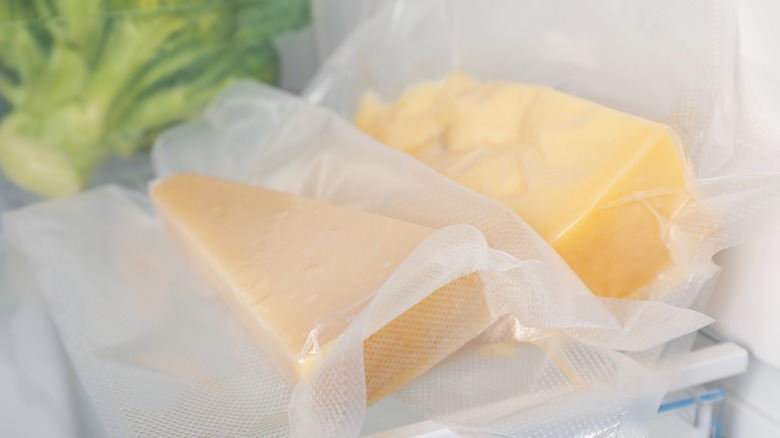The Common Storage Mistake That's Hurting The Flavor Of Your Cheese
Few things are quite as unsettling as biting into what was once a nice piece of cheese, only to find that it no longer tastes like cheese. The Brie tastes somewhat oniony, the Gouda a little citrusy, and the chèvre tastes like last night's leftovers. What happened? You probably made one key mistake; storing your cheese too close to other fragrant foods and ingredients.
Cheese, even if it looks quite solid, is relatively porous. When you pop it in the fridge without storing it properly, it works like a sponge, soaking up the wafting odors and flavors of its nearby food companions. This is true even of some of the best cheeses for cutting boards like cheddar and parmesan. That's why it's important not to store cheese alongside fragrant items like onions, garlic, and citrus, or herbs such as rosemary, sage, and basil. These foods contain strong scents that will seep into your cheese, drastically altering its flavor. That doesn't mean you should keep all your cheese stashed away in a drawer, though, or half-wrapped in its original plastic container and carelessly thrown in. To keep cheese smelling and tasting fresh, you might want to try some key cheese storage methods like wrapping it in wax paper, storing it in individual containers, or even freezing some types of cheese. For true cheese lovers, you could even get a vacuum-sealing machine or a fridge container designed especially to store cheese at ideal breathable and humid levels, like the Cheese Grotto.
Wrap your cheese in wax paper, not plastic
Plenty of folks have a designated cheese drawer that stores their assorted fromage. That's a step in the right direction. However, sometimes the call is coming from inside the house, meaning some popular cheese brands can be quite pungent. Gorgonzola, Stilton, Roquefort, and other stinky cheeses can leach their smell and flavor onto milder cheeses, so storing them separately is important. At the same time, you don't want to completely wrap your cheeses in plastic wrap, either. Doing so won't allow the cheese to breathe and will kill off the necessary good bacteria. Additionally, the plastic taste and smell itself can transfer to the cheese.
Cheese keeps best when it can breathe in a slightly humid environment, so wrapping it in cheesecloth or wax paper is ideal. After loosely wrapping your cheese, you might also want to try putting it in a second protective layer, such as a plastic food container with a hole-punctured lid. A punctured plastic bag can accomplish this task as well. These tricks will help prolong your cheese's flavor without letting it leak onto other cheeses.
If you only have plastic wrap at home, you can still use it, but be sure to swap out the plastic wrap every few days. This will give the cheese a chance to breathe and prevent the moisture from building up, which would degrade the flavor and texture of the cheese. Label and date each cheese variety to prevent confusion and spoilage.
Extending the life of your cheese
Storing cheese properly can become a bit labor-intensive. All the paper wrapping, labeling, and plastic wrap changing can be exhausting. While many cheeses last a long time, none of them last forever even in ideal conditions. Even if there's no visible mold, cheese is made up of bacteria that will die out. Over time, as these tiny organisms die out, the cheese will go bad. So if you'd like to extend the life of your cheese and don't want to eat it immediately, you can store some varieties in the freezer. This is a great solution if you have a ton of leftovers from a cheeseboard or you bought your cheeses in bulk.
The best cheese candidates for freezing are semi-hard, rindless, low-moisture cheeses such as cheddar, hard mozzarella, and provolone. That's because harder cheeses have lower moisture content and thus do not freeze well. Freezing these cheese varieties will keep them tasting good but it should be noted that the texture will be inevitably altered as a result of the ice crystals that form in the water and fat molecules. You shouldn't notice too much difference in flavor upon thawing but the cheese may have a crumblier, grainy mouthfeel. Also, melting previously frozen cheese will produce less stretchy, gooey results.
If you're serious about investing in cheese storage to extend its life, you could consider using a vacuum sealer for all opened cheeses or even acquiring a mini cheese cave for the home.


